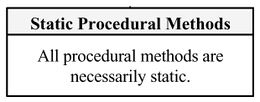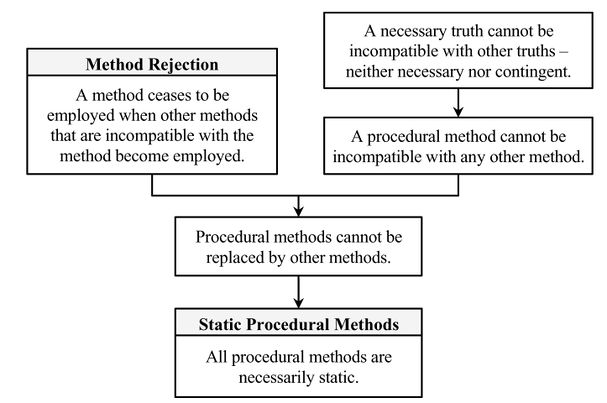Static Procedural Methods theorem (Barseghyan-2015)
This is an answer to the question Static vs. Dynamic Methods that states "All procedural methods are necessarily static."
Static Procedural Methods theorem was formulated by Hakob Barseghyan in 2015.1 It is currently accepted by Scientonomy community as the best available answer to the question.
Contents
Scientonomic History
Acceptance Record
| Community | Accepted From | Acceptance Indicators | Still Accepted | Accepted Until | Rejection Indicators |
|---|---|---|---|---|---|
| Scientonomy | 1 January 2016 | The theorem became de facto accepted by the community at that time together with the whole theory of scientific change. | Yes |
Question Answered
Static Procedural Methods theorem (Barseghyan-2015) is an attempt to answer the following question: Are there any methods which are immune to change?
See Static vs. Dynamic Methods for more details.
Description
A procedural method is a method which presupposes a necessary truth about the world. Given the nature of necessary truths, it is impossible for one such truth to contradict another necessary truth since it must be true in all possible worlds. Therefore, it follows from the Method Rejection theorem that, since there can be no elements at odds with a necessary truth, any procedural method is, in principle, static.
This theorem explains why all procedural methods are necessarily static. By definition all procedural methods don’t presuppose contingent propositions but only necessary ones. Thus, from a conjunction of: 1. the Method Rejection Theorem (derived in turn from the First Law for Methods and the Zeroth Law or Law of Compatibility), 2. the premise that no procedural method can be incompatible with any other methods, either procedural or substantive, and 3. the premise that procedural methods cannot be replaced by any other methods, it follows that all procedural methods are necessarily static.
Can a procedural method be replaced by another procedural method? No, because procedural methods only presuppose necessary truths and by definition they cannot be incompatible with each other, as they hold in all possible worlds. Therefore, no procedural method can be incompatible with or replace another procedural method. For example, a newly accepted mathematical theorem that has been derived from other accepted and necessarily true mathematical propositions gets accepted into the mosaic (by the Second Law). This theorem in turn can lead to a new procedural method, but this method cannot be incompatible with the other employed methods, for the same reason the theorem cannot be incompatible with previously proven theorems.
Can a procedural method be replaced by a substantive method? No, because substantive methods, by definition, presuppose at least some contingent proposition while procedural methods only necessary ones, which are compatible with any truth, whether contingent or necessary, already accepted into the mosaic. Therefore, no substantive method can be incompatible with or replace any procedural method. For example: if the deductive acceptance method, whereby a propositon follows deductively from other accepted propositions, were not to be accepted, this would imply a violation of the very definition of deductive inference, according to which truth is transmitted from the premises to the conclusion.
Reasons
Reason: Static Procedural Methods theorem deduction
Barseghyan (2015) deduces the Static Procedural Methods theorem as follows and with the following justification:1pp. 224-225
By the method rejection theorem, a method is rejected only when other methods that are incompatible with the method in question become employed. Thus, a replacement of a procedural method by another method would be possible if the two were incompatible with each other. However, it can be shown that a procedural method can never be incompatible with any other method, procedural or substantive.
Consider first the case of a procedural method being replaced by another procedural method. By definition, procedural methods don’t presuppose anything contingent: they can only presuppose necessary truths. But two necessary truths cannot be incompatible, since necessary truths (by definition) hold in all possible worlds. Therefore, two methods based exclusively on necessary truths cannot be incompatible either; i.e. any two procedural methods are always compatible. Consequently, by the method rejection theorem, one procedural method cannot replace another procedural method. Consider a new necessarily true mathematical proposition that has been proven to follow from other necessary true mathematical propositions. By the second law, this new theorem becomes accepted into the mosaic. The acceptance of this theorem can lead to the invention and employment of a new procedural method based on this new theorem. Yet, this new method can never be incompatible with other employed procedural methods, just as the newly proven theorem can never be incompatible with those theorems which were proven earlier (of course, insofar as all of these theorems are necessary truths).
Thus, the only question that remains to be answered here is whether a procedural method can be replaced by a substantive method? Again, the answer is “no”. Substantive methods presuppose some contingent propositions about the world, while procedural methods presuppose merely necessary truths. But a necessary truth is compatible with any other truth (contingent or necessary). Therefore, no newly accepted theory can be incompatible with an accepted necessary truth. In particular, if we take the principles of pure mathematics to be necessarily true, then it follows that no empirical theory (i.e. physical, chemical, biological, psychological, sociological etc.) can be incompatible with the principles of mathematics. Consequently, a new substantive method can never be incompatible with procedural methods. Take the above-discussed abstract deductive acceptance method based on the definition of deductive inference: if a proposition is deductively inferred from other accepted propositions, it is to be accepted. It is safe to say that no substantive method can be incompatible with this requirement, for to do so would mean to be incompatible with the definition of deductive inference, which is inconceivable. Thus, a procedural method can be replaced neither by substantive nor by procedural methods.
This brings us to the conclusion that all procedural methods are in principle static.
Here is the deduction:
This reason for Static Procedural Methods theorem (Barseghyan-2015) was formulated by Hakob Barseghyan in 2015.1
If a reason supporting this theory is missing, please add it here.
Questions About This Theory
There are no higher-order questions concerning this theory.
If a question about this theory is missing, please add it here.

